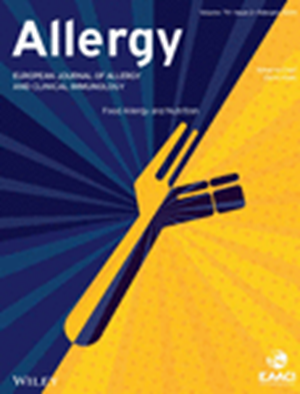战争对哮喘的影响,一项系统回顾和荟萃分析:EAACI工作组报告。
IF 12
1区 医学
Q1 ALLERGY
引用次数: 0
摘要
战争事件之后,哮喘患病率增加,据信这是环境危害和心理创伤共同造成的。本系统综述和荟萃分析旨在通过汇集各种战时暴露的可用数据,如职业、环境和心理因素,来调查这种关系。我们在MEDLINE、Scopus和Cochrane数据库中检索了测量战争相关暴露对哮喘影响的文章。使用有效公共卫生实践项目工具评估偏倚风险。然后使用检索到的效应来拟合元分析模型。共纳入48项研究,对应90项效应测量。与战争相关的创伤后应激障碍与哮喘结局的相关性最强(OR [95% CI] = 2.25[1.04, 4.89]),其次是经历至少一次危及生命的事件(1.96[1.18,3.26])和抑郁症(1.56[1.02,2.37])。虽然在亚组分析中,环境暴露也与哮喘风险增加有关(1.64[1.32,2.04]),但当模型中包括心理变量时,这种影响被减轻了。研究结果表明,战时事件和冲突可能会增加哮喘患病率和与哮喘相关的结果。哮喘症状、肺功能和心理健康的管理似乎对在战区经历过心理创伤的个体至关重要。试验注册:普洛斯彼罗注册号:CRD42023444101。本文章由计算机程序翻译,如有差异,请以英文原文为准。
The Impact of War on Asthma, a Systematic Review and Meta-Analysis: An EAACI Task Force Report.
Wartime events have been followed by an increase in asthma prevalence, which is believed to result from a combination of environmental hazards and psychological trauma. This systematic review and meta-analysis aimed to investigate this relationship by pooling available data on various wartime exposures, such as occupational, environmental, and psychological factors. MEDLINE, Scopus, and Cochrane databases were searched for articles that measure the effect of war-related exposures on asthma. Risk of bias was assessed using the Effective Public Health Practice Project tool. The retrieved effects were then used to fit meta-analytical models. A total of 48 studies, corresponding to 90 effect measures, were included. War-related post-traumatic stress disorder showed the strongest association with asthma outcomes (OR [95% CI] = 2.25 [1.04, 4.89]), followed by experiencing at least one life-threatening event (1.96 [1.18, 3.26]) and depression (1.56 [1.02, 2.37]). Although environmental exposures were also associated with an increased asthma risk in subgroup analysis (1.64 [1.32, 2.04]), this effect was mitigated when psychological variables were included in the models. The study's results show that wartime events and conflicts may increase asthma prevalence and outcomes associated with asthma. The management of asthma symptoms, lung function, and mental health seems fundamental in individuals who have experienced psychological trauma in war zones. Trial Registration: PROSPERO registration number: CRD42023444101.
求助全文
通过发布文献求助,成功后即可免费获取论文全文。
去求助
来源期刊

Allergy
医学-过敏
CiteScore
26.10
自引率
9.70%
发文量
393
审稿时长
2 months
期刊介绍:
Allergy is an international and multidisciplinary journal that aims to advance, impact, and communicate all aspects of the discipline of Allergy/Immunology. It publishes original articles, reviews, position papers, guidelines, editorials, news and commentaries, letters to the editors, and correspondences. The journal accepts articles based on their scientific merit and quality.
Allergy seeks to maintain contact between basic and clinical Allergy/Immunology and encourages contributions from contributors and readers from all countries. In addition to its publication, Allergy also provides abstracting and indexing information. Some of the databases that include Allergy abstracts are Abstracts on Hygiene & Communicable Disease, Academic Search Alumni Edition, AgBiotech News & Information, AGRICOLA Database, Biological Abstracts, PubMed Dietary Supplement Subset, and Global Health, among others.
 求助内容:
求助内容: 应助结果提醒方式:
应助结果提醒方式:


